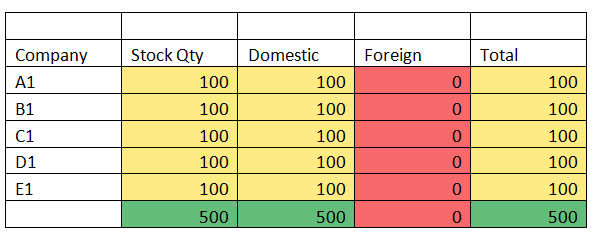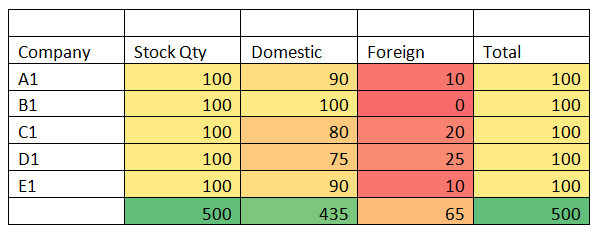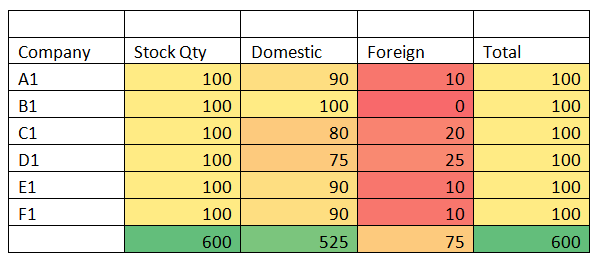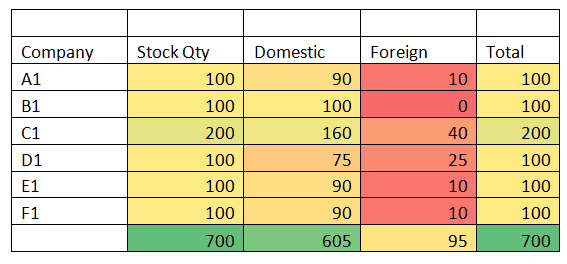Misconception on Foreign Funds Causes Increase Volume
InvestorEducation / Learning to Invest Sep 07, 2012 - 06:09 AM GMTBy: Sam_Chee_Kong
 Volume had long been an important indicator in the study of market sentiment. A bull market accompanied by heavy volume indicates commitment among investors and is usually regarded as healthy and will help prolong the run. Whereas a bull run with light volume indicate less commitment from investors and eventually the trend will run its course much sooner than expected. However over the past there had been much misconception among investors regarding the volume of shares in a particular stock market.
Volume had long been an important indicator in the study of market sentiment. A bull market accompanied by heavy volume indicates commitment among investors and is usually regarded as healthy and will help prolong the run. Whereas a bull run with light volume indicate less commitment from investors and eventually the trend will run its course much sooner than expected. However over the past there had been much misconception among investors regarding the volume of shares in a particular stock market.
Wrong perception on foreign funds
It is perceived not only among investors but also analyst that an increase inflow of foreign funds will eventually lead to an increase in volume in the stock market. Hence it will be bullish in the short and medium term. In fact we always hear about analyst blaming the lackluster performance of the local stock market is due to the lack of participation of foreign funds. This brings us to the next question on whether they know what they are talking about?
We shall present below a study on whether the inflow of foreign funds does increase the volume in the stock markets. Below is a chart on the different components that help made up the total volume in the market. The Stock market is actually made up of three different markets and they are the Primary, Secondary and Tertiary Markets and by adding their volumes it will give us the total market volume.

From the above it can be deduce that the total volume in the market consists of Primary, Secondary and Tertiary volumes. Tertiary volume is the volume of new shares from new IPOs. Primary volume is the existing volume of all the stocks traded in the market. Secondary volume is derived from a stock split or bonus issue (stock dividend).
To build our case on whether foreign funds will actually increase the volume in the stock market as many investors perceived, we think of a hypothetical stock market based on the following assumptions.
- Only 5 companies
- 100 shares are allocated to each of them
So our model stock market will look like the following.
Table 1
Stocks held by Domestic and Foreign Investors

From the table, initially all stocks are held by domestic or local investors. The total shares are 500 and equally divided into 5 companies. What will happen when foreign investors start buying up some shares in the local companies? In Table 2 below we will present to you the scenario on what will happen.
Will Foreign Buying Increase Primary Volume?
Table 2
Stocks held by Domestic and Foreign Investors

The above table shows the effect as a result of shares purchase by some foreign funds in companies A1, C1, D1 and E1 which amounts to 65 shares. The total volume of shares still remains at 500 but the only difference is that the locals now held fewer shares with only 435 and the balance of 65 shares were held by the foreign investors. So in other words there is no increase in the Primary Volume as a result of foreign investors buying into the market and the only change is the transfer of ownership from the local to foreigners.
How about Tertiary Volume?
As we have explained earlier the Tertiary Market consists of new IPOs. IPOs are classified into Tertiary because they are newly listed companies and foreign investors can participate through the allocation to institutional investors.
Table 3
Stocks held by Domestic and Foreign Investors after an IPO

As can be seen from the above, as a result of the IPO from F1 the volume of shares went up from 500 to 600 and so does the volume of shares held by foreign investors. In this case foreign investors did increase their holdings by 10 shares through its allocation to foreign investors. However this is only a ‘One Off’ situation, where after the shares are listed, it will be transferred to the Primary Volume. Its influence can be considered negligible.
Same for Secondary Volume?
The same situation will exist in the Secondary Market where the volume increases after a share split or bonus issue and to a lesser extent through rights issue. The following table shows the effect after a 1 : 1 share split by C1.
Table 4
Stocks held by Domestic and Foreign Investors after share split performed by C1

Although after this exercise, it does increase the foreign holdings but its effect can be negligible. This is because such corporate exercise will not happen every year.
Not all capital inflows go to Portfolio investments
In summary, we can conclude that despite all the excitement over the increase inflow of foreign funds, its effect on the volume on the stock market is negligible. The only benefit will be the increase in liquidity in the markets. How much of the capital inflows that go into the portfolio is another question as we know some of it will also go into fixed income investments. In fact quite a fair bit of the inflows are make up of what we call ‘carry trades’ and does not go into portfolio investments .
A good example will be the Japanese carry trade. A carry trade is basically an arbitrage of interest rates in different countries. To show you how a carry trade works we present you the following example.An investor will first borrows 1 million Japanese yen from a Japanese bank with an interest rate of 0.5%. Then he converts it into Rupiah to buy Indonesian Sovereign bonds that yield 6.8%. What happen next is that the investor automatically earns 6.3% (6.8% - 0.5%) from this venture without doing anything as long it is kept till maturity. But such a trade involves foreign exchange exposures because what if the Rupiah depreciates? If the depreciation is large enough it will not only wipe out the 6.3% gain but also incur heavy losses to the investor. To avoid such losses, the investor can hedge his investment through foreign exchange forward contracts and options.
In other words, why should foreign investors risk their capital gambling in the stock markets while they can earn money without having to do anything. In recent years since the 'carry trade crisis' a few years back, investors are much wiser by hedging their investments. So it is not surprise to see a big chunk of the capital inflows are carry trades in nature.
In actual fact foreign funds does more damage to the stock market than the benefits it can provide. Any signs of an economic downturn, they are the first to withdraw their funds. By pulling out from the stock market it not only create a hole in the market but also will help to contribute to the devaluation of the currency in the host country through the depletion of its foreign reserves. In short, if it (foreign fund) is 'hot money' in nature then it will give more trouble than it's worth.
by Sam Chee Kong
cheekongsam@yahoo.com
© 2012 Copyright Sam Chee Kong - All Rights Reserved
Disclaimer: The above is a matter of opinion provided for general information purposes only and is not intended as investment advice. Information and analysis above are derived from sources and utilising methods believed to be reliable, but we cannot accept responsibility for any losses you may incur as a result of this analysis. Individuals should consult with their personal financial advisors.
© 2005-2022 http://www.MarketOracle.co.uk - The Market Oracle is a FREE Daily Financial Markets Analysis & Forecasting online publication.



